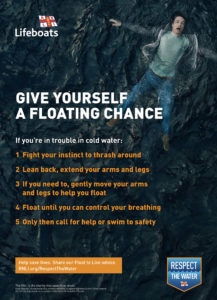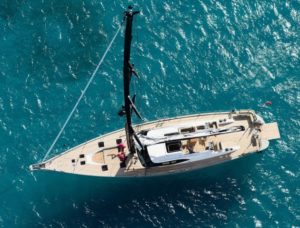Coastal deaths 2017: RNLI says ‘floating’ saves lives

The Royal National Lifeboat Institution (RNLI) has today announced seven¹ people claimed ‘floating’ helped save their life in 2017, after the charity advocated this as a key survival skill last summer.
• Coastal fatality figures² released today, show 22 people lost their lives at the coast in North East and East England in 2017 (31 in 2016)
• Over half (55%) did not intend to enter the water
• 91% of the fatalities were men
As the RNLI’s national drowning prevention campaign Respect the Water enters its fifth year, the charity is urging anyone who finds themselves in trouble in cold water to stay calm and ‘float’.
Nick Ayers, RNLI Community Safety Partner, says: “Losing someone to drowning is a shattering experience, so I am very pleased several people said the RNLI’s Respect the Water ‘float’ advice helped them survive in a dangerous situation in the water last year. We are hopeful that our safety campaigning and education work will contribute to a reduction in coastal deaths, but we cannot get complacent. It’s vital we all keep sharing lifesaving advice. One drowning, is one too many.
“Male deaths made up 91% of the fatalities at the north east coast in 2017, with many of them ending up in the water unexpectedly. It clearly highlights much more must be done to help men keep themselves safe around the coast.”
This year the charity is calling on the public to practice the ‘float’ survival skill – a simple skill that could mean the difference between life and death – and to share this lifesaving knowledge with others.
Evan Chrisp, 16, was one of the seven people who said ‘floating’ helped save their life in 2017. Evan says: “I was jumping over waves with friends and got swept out to sea. I tried to fight the water and swim hard, but I quickly realised this wasn’t working and I was in serious danger. I remembered the RNLI’s advice to float on my back and this helped me catch my breath and calm down before then trying to swim to safety.
“Thankfully I made it to a nearby yacht. My Dad had watched me get in to trouble from the shore and had called 999 for the Coastguard. Ultimately I think the RNLI’s advice to float saved my life.”
If you get into trouble in cold water, the RNLI’s advice is to float on your back for a short time to regain control of your breathing.
Mike Tipton³ MBE, Professor of Human and Applied Physiology at the University of Portsmouth, and world leading expert in cold water shock explains: “The instinctive human reaction on immersion in cold water is a potential killer as this can cause panic and thrashing around, increasing the chances of breathing-in water. This also lets trapped air escape from clothing, reducing buoyancy.
“Although it’s counter intuitive, the best immediate course of action is to fight your instinct and float on your back. Once you’ve gained control of your breathing you can swim to safety, call for help, or continue to float until help arrives.
“Floating is not always something people are confident they can do, but most people can float; in fact recent practical trials with the RNLI suggest people find it easier than they expect. The recommended floating position to keep your airway clear is to lean back, extend your arms and legs, and keep movement to a minimum, as air trapped in your clothing will help you float. If needed, gently sculling your hands and feet can help you stay afloat; I’d advise everyone to practice in a controlled environment like a swimming pool.
“Doing this will give you a much better chance of surviving.”
The RNLI has created a new video explaining the key steps to floating, to help give people the confidence to be able to float if they find themselves in trouble in cold water. The video is available at: RNLI.org/RespectTheWater (https://www.respectthewater.com) and explains the five steps to floating, to help give people the confidence to be able to float if they find themselves in trouble in cold water.
For those planning to go into the water, the best way to enjoy it safely is to choose a lifeguarded beach and swim between the red and yellow flags – the area most closely monitored by the lifeguards. And if you see someone else in danger in the water at the coast, fight your instinct to go in and try to rescue them yourself, instead call 999 or 112 and ask for the Coastguard.
The Respect the Water campaign will run throughout the summer with advertising across cinema, outdoor posters, radio, online, and catch-up TV channels. The RNLI is asking people to visit RNLI.org/RespectTheWater (https://www.respectthewater.com) where they will find information on floating. On social media search #RespectTheWater #FloatToLive.
¹ RNLI records of people who spoke to the charity and said the 2017 Respect the Water ‘float’ advice help save their life when in a dangerous situation in the water. Some people wish to remain anonymous.
² Records from the National Water Safety Forum’s Water Incident Database (WAID) 2013–2017. RNLI has analysed the data using GIS software to plot and analyse incidents before inclusion in a specific coastal dataset (accident and natural causes only).
³ This year, the RNLI along with Professor Mike Tipton and the University of Portsmouth, conducted floating trials with over 80 people, to understand more about how people float to further inform the advice.

Credit: RNLI/Clare Hopps











